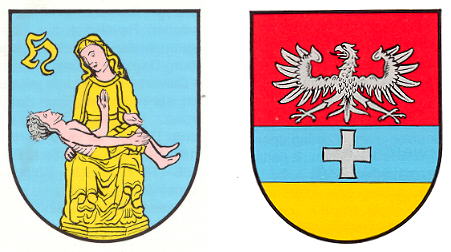Hauenstein (Pfalz): Difference between revisions
Knorrepoes (talk | contribs) m (Text replacement - "{{media}}" to " {{de1}} {{media1}}") |
Knorrepoes (talk | contribs) m (Text replacement - "{{de}}" to "") |
||
| Line 1: | Line 1: | ||
'''HAUENSTEIN''' | '''HAUENSTEIN''' | ||
Revision as of 17:00, 26 December 2022
HAUENSTEIN
State : Rheinland-Pfalz
District (Kreis) : Südwestpfalz
Verbandsgemeinde : Verbandsgemeinde Hauenstein
| German |
In geteiltem Schild oben in Rot ein silberbewehrter und -bezungter silberner Adler, unten von Blau, darin ein schwebendes gleichschenkliges silbernes Kreuz, und Gold geteilt. |
| English | (Pfalz) No blazon/translation known. Please click here to send your (heraldic !) blazon or translation |
Origin/meaning
The old (left) arms were granted on May 28, 1949, the new arms were granted on November 13, 1964.
The old arms show a statue from the church in the village as well as the letter H. These arms had no historical significance and were designed in 1949.
The new arms were designed in 1964 and combine elements from the arms of the former rulers in the area.
The eagle in the upper part of the arms is derived from the arms of the Lords of Than, Lords of Daun in the 14th century. Hauenstein at the time was part of the Daun Estate. In 1603 a large part of the estate was acquired by the Bishops of Speyer, and this is symbolised by the cross of Speyer in the centre of the shield. The other part of the estate was acquired by the Lords Schenk of Waldenburg who used arms divided in blue and gold, which forms the lower part of the Hauenstein arms.
Literature: Debus, 1988
